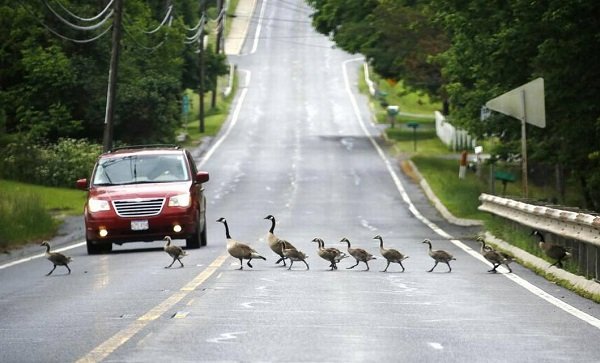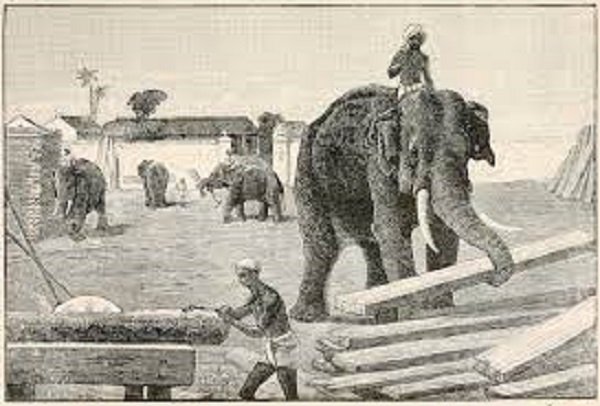In the annals of American legislation, a collection of truly bizarre and bewildering laws stands out, testifying to the quirkiness of human governance. From the ice cream cone prohibition in Alabama to the duck crossing requirement in Minnesota, these ten weirdest laws in U.S. history elicit both laughter and disbelief. In Carmel-by-the-Sea, California, residents must obtain a permit to wear shoes with heels higher than two inches, while in Oklahoma, wrestling bears or placing whale blubber on city streets is strictly forbidden. Whether it’s North Carolina’s unconventional stance on off-key singing or Gary, Indiana’s curfew on public events after consuming onions or garlic, these laws shine a light on the absurdities that have permeated American legal history.
The “Ice Cream Cone” Law in Alabama
In the realm of peculiar legislation, the “Ice Cream Cone” law in Alabama undoubtedly takes the crown. Enshrined in the state’s legal code, this quirky statute explicitly prohibits the act of carrying an ice cream cone in one’s back pocket at any given time. While the origins and rationale behind such a law remain shrouded in mystery, it serves as a reminder of the seemingly arbitrary nature of some legislative decisions. Perhaps this peculiar prohibition emerged from a peculiar incident, lost in the depths of history. Nonetheless, it stands as a testament to the colorful tapestry of American laws, where the mundane and the absurd can coexist. So, if you ever find yourself in Alabama, it’s best to savor your ice cream cone without any thoughts of pocket placement—lest you run afoul of the law.

The “Duck Crossing” law in Minnesota
Nestled within the mosaic of unusual legislation lies the curious “Duck Crossing” law in Minnesota. This peculiar statute mandates that motorists must come to a halt and patiently wait for ducks to waddle across the road, should the avian creatures choose to do so. While the law aims to protect the local wildlife and prevent any harm to these feathered pedestrians, it evokes a whimsical image of drivers patiently idling by as ducks leisurely meander across the asphalt. One can imagine the bemused expressions on the faces of both drivers and ducks as they navigate this unique traffic interaction. This law serves as a reminder of the harmonious coexistence between humans and the natural world, where even the most mundane activities can intersect with the extraordinary. So, next time you find yourself traversing the roads of Minnesota, keep an eye out for those delightful quackers, and don’t forget to give them the right of way as they embark on their leisurely duck crossings.
The “Whale Blubber” law in Oklahoma
Among the enigmatic statutes of American history, the “Whale Blubber” law in Oklahoma emerges as a peculiar gem. Unveiling a unique combination of regulations, this law not only prohibits engaging in bear wrestling but also expressly forbids placing whale blubber on city streets. The rationale behind this legislation remains a mystery, as neither whales nor their blubber are indigenous to the landlocked state of Oklahoma. One can only speculate about the whimsical circumstances or imaginative concerns that prompted the inclusion of this specific provision. Nevertheless, this law serves as a reminder that legal codes can contain eccentricities, embodying the idiosyncrasies of the society they govern. Though the enforcement and relevance of this law may have waned, its presence in Oklahoma’s legal history adds a touch of peculiarity to the tapestry of American laws. It stands as a testament to the unpredictability and curious nature of legislative endeavors throughout history.
The “No Flip-Flops” Law in Carmel-by-the-Sea, California
Adding a touch of sartorial quirkiness to the legal landscape, the “No Flip-Flops” law in Carmel-by-the-Sea, California, stands as a distinctive piece of legislation. This peculiar law stipulates that wearing shoes with a heel higher than two inches or with a base less than one square inch is prohibited unless one obtains a permit. The intent behind this regulation remains elusive, raising questions about its origins and practicality. It conjures images of locals and visitors alike navigating the picturesque streets of Carmel, carefully adhering to the footwear guidelines or procuring the necessary permits. While the law may seem whimsical, it reflects the uniqueness of the community and its desire to maintain a particular aesthetic. Whether this regulation is enforced strictly or embraced as a charming peculiarity, it adds a dash of eccentricity to Carmel-by-the-Sea’s character, showcasing the diversity of laws that shape the fabric of American municipalities.
The “Singing in Public” law in North Carolina
North Carolina’s “Singing in Public” law adds a melodious twist to the tapestry of legal oddities. This peculiar statute makes it illegal to sing off-key in public, providing the potential for the arrest of those deemed a “habitual and common disturber of the peace.” While the idea of regulating the quality of vocal performances may raise eyebrows, the law’s intention likely lies in maintaining public tranquility. Yet, the subjective nature of determining what constitutes “off-key” singing renders enforcement rather whimsical. One can only imagine the amusing scenarios that may arise as authorities assess the tonal accuracy of impromptu street serenades. Whether the law serves as a lighthearted jest or a serious attempt to curb cacophony, it certainly infuses North Carolina’s legal landscape with an intriguing and melodic note, reminding us that even in matters of law, harmony and discord can find themselves entwined.
The “Cabbages” law in Gary, Indiana
In the realm of peculiar regulations, the “Cabbages” law in Gary, Indiana, leaves an indelible mark. According to this curious statute, it is unlawful to attend a public event or use public transportation within four hours of consuming onions or garlic. The inclusion of such a specific provision raises eyebrows and piques curiosity about its origin and purpose. Perhaps it emerged from a whimsical incident or an attempt to mitigate the potential olfactory consequences of pungent food consumption. Regardless of its rationale, this law underscores the unique tapestry of legislative oddities found in various jurisdictions. Imagining residents of Gary, Indiana, keeping a meticulous watch on their onion and garlic intake before venturing out to public gatherings or hopping on a bus elicits a blend of amusement and perplexity. While the practical enforcement of this law may be questionable, its existence adds a dash of eccentricity to Gary’s legal history, standing as a reminder of the unexpected idiosyncrasies embedded in the fabric of American legislation.
The “No Whistling on Sundays” law in Topeka, Kansas
Topeka, Kansas, boasts an intriguing entry in the annals of unusual legislation with its “No Whistling on Sundays” law. According to this peculiar statute, individuals are prohibited from whistling while underwater specifically on Sundays. The reasoning behind this law remains obscure, leaving room for speculation about its origins. It may have stemmed from an attempt to preserve the sanctity of Sundays or to maintain a serene aquatic environment. Whatever the rationale, the image of individuals submerged in water, refraining from whistling on the designated day of the week, evokes a whimsical and amusing scene. While the enforcement of such a law may seem implausible, its existence serves as a reminder of the unique and sometimes enigmatic laws that find their way into legal codes. Topeka’s “No Whistling on Sundays” law adds an intriguing touch to the tapestry of American legislation, showcasing the blend of practicality, tradition, and occasional oddity that characterizes legal systems across the nation.
The “Elephant Parades” law in Atlantic City, New Jersey
The “Elephant Parades” law in Atlantic City, New Jersey, presents an enchanting and unusual piece of legislation. This quirky statute explicitly prohibits elephants from walking on the Boardwalk. The presence of such a law sparks curiosity and imagination about the circumstances that led to its creation. While elephants strolling along the iconic Atlantic City Boardwalk may seem like an extraordinary sight, this law ensures that it remains a whimsical fantasy. Whether born out of concerns for public safety or simply as a lighthearted nod to the absurd, the “Elephant Parades” law adds a touch of charm and playfulness to the coastal city’s legal framework. While the chances of an elephant sighting on the Boardwalk may be slim, the law serves as a reminder of the delightful eccentricities that can be found within the diverse tapestry of American laws.
The “Spitting” law in Quitman, Georgia
Nestled within the array of peculiar laws, the “Spitting” law in Quitman, Georgia, emerges as a distinct and curious regulation. According to this legislation, it is illegal to spit from a moving car or bus, with an intriguing exception that allows spitting from a truck. The rationale behind this particular distinction remains shrouded in mystery, leaving room for speculation and imaginative interpretations. The law not only raises questions about the underlying concerns that prompted its enactment but also prompts one to envision the peculiar scenarios that might have led to its creation. While the enforcement of such a law may be sporadic, its existence adds a touch of quirkiness to Quitman’s legal landscape, serving as a reminder of the unique and occasionally puzzling laws that dot the map of American jurisdictions. It stands as a testament to the intriguing, sometimes inexplicable, nature of legislation and its role in shaping societal norms.
The “Bingo Games” law in North Carolina
The “Bingo Games” law in North Carolina presents an intriguing addition to the array of peculiar regulations. According to this statute, bingo games are subject to strict time constraints, with a maximum duration of five hours. However, on the Fourth of July, the time limit is extended to a generous 10 hours. The peculiar discrepancy in game duration on this specific day adds an element of whimsy to the law. One can envision avid bingo enthusiasts eagerly marking their cards, hoping to maximize their playtime during the Independence Day festivities. The origins of this law and the reasoning behind the extended duration of the Fourth of July remain unclear, but it serves as a distinctive reminder of the intricate web of regulations governing recreational activities. Whether it reflects a desire to celebrate the holiday with prolonged bingo entertainment or simply adds a touch of peculiarity to North Carolina’s legal landscape, the “Bingo Games” law is a testament to the unique tapestry of laws that exist across the nation.
Conclusion
The top 10 weirdest laws in U.S. history provide a fascinating glimpse into the quirkier side of legislation. From ice cream cones in pockets to bear wrestling and underwater whistling, these laws highlight the eccentricities that have found their way into the legal codes. While some of these laws may have been enforced strictly in the past, their existence today serves as a reminder of the evolving societal norms and the humor that can be found in the legal system. Although these laws may seem bizarre, they add a unique flavor to the tapestry of American legal history, showcasing the diverse and sometimes peculiar nature of the laws that govern our society.




